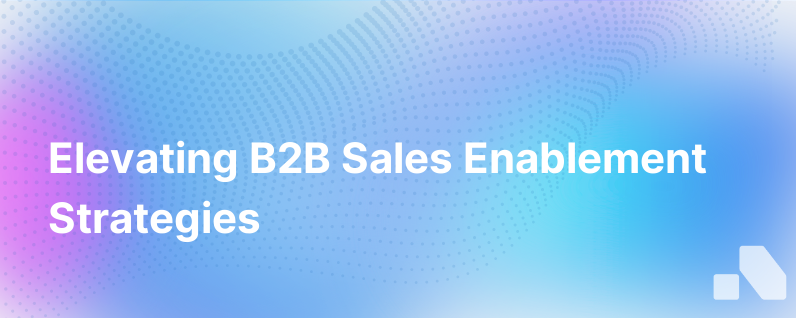
In the high-speed world of B2B sales, the difference between closing or losing a deal often hinges on a sales team's enablement strategy. Sales enablement is the process of providing your sales organization with the information, content, and tools that help salespeople sell more effectively. At its core, sales enablement ensures that every sales rep has what they need to engage every buyer successfully.
Here are crucial strategies to elevate B2B Sales Enablement to match today's challenges.
Prioritize Continuous Learning and Development
Training shouldn’t be a one-time event. Instead, continuous learning and skill development should be a staple. This development includes deep product knowledge, understanding the nuances of customer needs, and honing interpersonal skills.
Implement Microlearning: Bite-sized learning is more digestible and less disruptive. Use microlearning modules to reinforce concepts and keep sales teams current without overwhelming them with information overload.
Role-Play Scenarios: Practice makes perfect. Organize regular role-playing sessions to simulate sales scenarios, including difficult objections or challenging customer personalities.
Forge a Content Arsenal
In B2B, content is more than king – it's the arms and armor of your sales warriors. Equip your sellers not just with content, but the right kind of content, personalized to the pain points, industry, and purchase stage of each prospect.
Create Gated Content: Whitepapers, eBooks, and case studies are excellent resources that can also double as lead generation tools.
Develop Interactive Tools: Things like ROI calculators or product configurators can involve the prospect in a hands-on way, leading to higher engagement and a deeper understanding of value propositions.
Embrace Cutting-edge Technologies
The sales landscape is continually evolving with technology. Your sales enablement strategy should include the latest tools that help streamline and automate tasks.
CRM Systems: Deploy a CRM system to manage customer data, track interactions, and provide insights on customer behaviors.
Sales Intelligence Tools: Utilize platforms that offer real-time insights into accounts. These tools can help identify key decision-makers, understand company news, and track industry movements.
Data Analytics Platforms: Sales teams need to know what works and what doesn't. With data analytics, they can track performances and tweak strategies accordingly.
Optimize Sales Content with Data Analytics
To identify what resonates with customers and adjust your content strategy accordingly, you'll want to have robust analytics in place.
A/B Testing: For every piece of content, run tests to see which version generates the most engagement or leads to the most conversions.
Content Utilization Reports: Keep an eye on what content is being used most by the sales team and what's leading to close deals.
Enhance Collaboration Between Sales and Marketing
Efficient communication and collaboration between Sales and Marketing are vital for a seamless customer journey. This partnership ensures consistent and effective messaging.
Regular Alignment Meetings: Keep both teams on the same page with scheduled meetings to discuss strategies, content needs, feedback, and more.
Shared KPIs: When Sales and Marketing share common goals, such as revenue targets or qualified lead generation, both teams have an incentive to work together more closely.
Commit to Buyer-Centric Sales Practices
The modern B2B buyer expects a personalized approach. Your sales enablement strategy should center around understanding buyer personas, industry specifics, and the customer's buying journey.
Create Buyer Personas: Understand customer motivations, pain points, and priorities.
Account-Based Marketing (ABM): Tailor your sales and marketing efforts to specific high-value accounts to ensure a hyper-personalized approach.
Regular Feedback Loops: Foster open channels for feedback from prospects and customers, and use that data to refine tactics continuously.
Refine Onboarding Processes
An effective onboarding process can set up new sales reps for success.
Comprehensive Training: Incorporate training modules that cover all aspects of the sales process, product knowledge, and the target market.
Mentorship Programs: Pair new hires with experienced reps to facilitate knowledge transfer and acclimation to company culture.
Monitor and Analyze Performance Metrics
You can't improve what you don't measure. Have systems in place to track sales performance and key metrics.
Set Clear KPIs: Specific, measurable, attainable, relevant, and time-bound (SMART) KPIs can help gauge success and identify areas for improvement.
Regular Reviews: Encourage continuous improvement by conducting performance reviews and providing constructive feedback.
Conclusion
Enhancing your B2B sales enablement process is about more than just equipping your team with tools and techniques; it's about creating a culture that is entirely buyer-focused, adapting continuously to changing market dynamics, and leaning heavily into the beautiful dance of technology and human touch. The desired outcomes of such enhancements are not only increased sales effectiveness and efficiency but also richer, more robust relationships with clients that feed into long-term success and growth.
While Aomni offers an AI platform that can comprehensively address several of these strategies through real-time account research and personalized sales content, the holistic implementation of a well-rounded sales enablement strategy remains a team effort rooted in the commitment to the modern sales process.
Sources:
- Revolutionize B2B Sales: Power Up with Advanced Enablement Tech
- B2B Sales Enablement: Your Guide to Creating a Robust Strategy
- B2B Sales Training Techniques and Best Practices
- Content Marketing: How to Make it a Key to Sales Enablement
- Data-Driven Sales Enablement: Track, Measure, Improve
- Your Sales Are in the Bag With This Guide to B2b Sales Training.
- Why You Need B2B Sales Enablement Content and 15 Content Types That Deliver Results
- Data-Driven Sales Enablement: 10 Must-Haves for Today’s Modern Seller